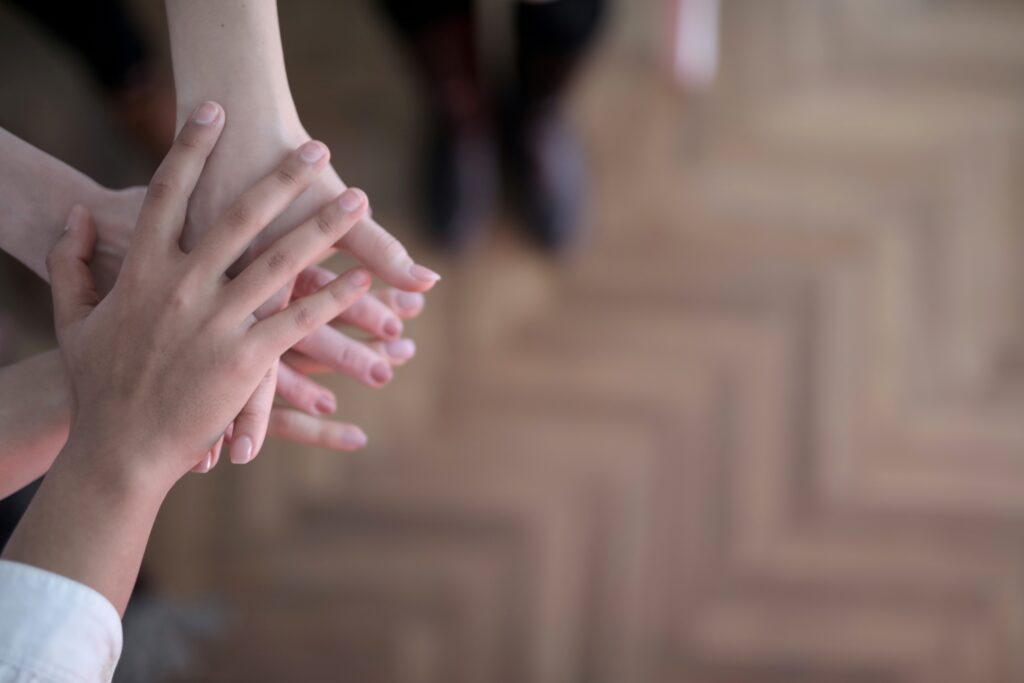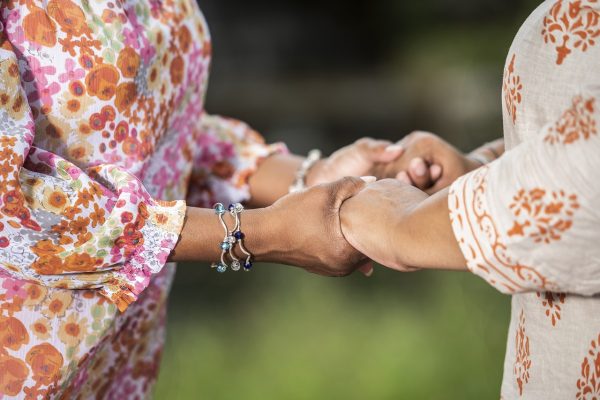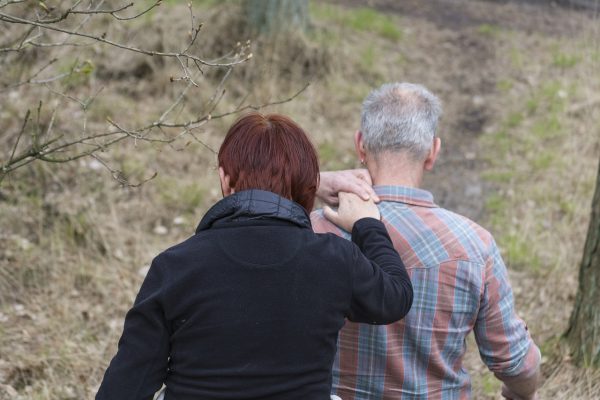These verses are intended to be read as introduction to birkat hagomel (a prayer said during the Torah service by one who has survived a dangerous situation) by someone who has suffered a miscarriage.
כְּצִיץ יָצָא וָיִמָּל וְיִבְרַח כַּצֵּל וְלֹא יַעֲמֹד… אִם חֲרוּצִים יָמָיו מִסְפַּר חֲדָשָׁיו אִתָּךְ חֻקָּיו עָשִׂיתָ וְלֹא יַעֲבֹר
Ke-tzitz yatza va-yimal, va-yivrah ka-tzel ve lo ya’amod…. Im harutzim yamav mispar hadashav itakh hukav asita ve-lo ya’avor.
“He blossoms like a flower and withers; he vanishes like a shadow and does not endure” (Job 14:2).
“Seeing his days are determined, the number of his months are with You, You set him limits that he could not pass.” (Job 14: 5).
אֱלֹקִים הֲרֵינִי מְשִׁיבָה לְיָדֶיךָ הַנֶּאֱמָנוֹת אֶת הֶחָי הַנּוֹצָר שֶׁהִפְקַרְתָּ בִּי לִזְמַן כֹּה קָצָר
Elohim hareyni m’shivah l’yadeykha hane’ehmanot et heykhai hanotzar shehifkartah bi l’zman ko katzar.
O God, I commend back to Your safekeeping the potential life entrusted to me for so short a time.
For first pregnancies terminated before 40 days:
טֶרֶם מִלְאוּ לוֹ אַרְבָּעִים יְמֵי יְצִירָה, עֻבָּר זֶה לֹא פָּתַח אֶת רַחֲמִי, אֵין הוּא בְּכוֹרִי וּבְכֹל זֹאת בּוֹכִיָּה אֲנִי עַל עֲזִיבָתוֹ אֶת גּוּפִי הַמָּגֵן
Terem milu lo arbaim y’mey y’tzirah u’bar zeh lo rakhami eyn hu b’khori u’v’khol zot bokhiyah ani al azivato et gufi hamagen.
Not yet having reached 40 days of life, this fetus did not open my womb; it was not my bakhor. Still I grieve its passing out of the protection of my body.
For first pregnancies terminated after 40 days:
בְּהַגִּיעוֹ ל__________ שָׁבוּעוֹת יְצִירָה עֻבָּר זֶה הָיָה בְּכוֹרִי פָּתֹחַ אֶת רַחֲמִי בּוֹכִיָּה אֲנִי עַל עֲזִיבָתוֹ אֶת גּוּפִי הַמָּגֵן
B’hagiyo l’_______ sh’vuot y’tzirah u’bar zeh hayah b’khori patokha et rakhami bokhiyah ani al azivato et gufi hamagen.
Having reached _____ weeks, this fetus was my bakhor, opening my womb. I grieve its passing out of the protection of my body.
If not first pregnancy:
בְּהַגִּיעוֹ ל________ שָׁבוּעוֹת יְצִירָה עֻבָּר זֶה הָיָה יָכוֹל לִהְיוֹת יַלְדִּי ה________, בּוֹכִיָּה אֲנִי עַל עֲזִיבָתוֹ אֶת גּוּפִי הַמָּגֵן
B’hagiyo l’_______ sh’vuot y’tzriah u’bar zeh hayah yakhol l’hiot yaldi ha______ bokhiyah ani al azivato et gufi hamagen.
Having reached _____ weeks, this fetus would have been my (number) child. I grieve its passing out of the protection of my body.
All continue here:
יָדַעְתָּ עֵת לֶדֶת יַעֱלֵי- סַלַע חֹלֵל אַיָּלוֹת תִּשְׁמֹר
Yada’ta et ledet ya’aley sala, kholell ayalot tishmor.
“You know when the wild goats of the rock give birth; You mark when the hinds calve” (on Job 39 :1 ).
You created the miracle of birth and the wonder of the body that cares for mother and child.
דַּיָּן הָאֱמֶת אַתָּה הַדּוֹאֵג לִיצִרֵי כַּפֶּיךָ אַף כַּאֲשֶׁר כּוֹס הַתַּמְרוּרִים מְלֵאָה. מִי אָנוּ שֶׁנָּבִין דְּרָכֶיךָ, לַדַּעַת מַה עָתִיד הָיָה לִהְיוֹת לִי וּלְיַלְדִּי זֶה לוֹ נוֹלָד אַחֲרֵי תִּשְׁעָה יְרָחִים
Dayan haemet atah hadoeg litzirey kapekha af k’asher kos hatamrurim m’leyah. Mi anu shenavin d’rakheykha l’da’at mah atid hayah l’hiot li ul’yaldi zeh lo nolad akharey tish’ah y’rakhim.
Dayyan HaEmet. Righteous Judge, You care for Your creatures even when such care tastes bitter.
Who are we to understand Your ways, to know what future would have lain ahead for myself and my child had it come to term?
אַךְ בְּשָֹרָ(ה) עֲלֵי(ה) יִכְאַב וְנַפְשָׁ(ה) עָלַי(ה) תֶּאֱבָל
Akh bsar(ah) ale(ha) yikh’av, ve-nafsh(ah) ale(ha) te’eval.
“But her flesh upon her shall have pain and her soul within her shall mourn” (adapted from Job 14:22).
הָרַחֲמָן, רָפֵּא גּוּפִי וְנִשְׁמָתִי, רָפֵּא רֶחֱמִי עַד כִּי אוּכַל לָלֶדֶת נְשָׁמָה בְּרִיאָה שֶׁאוּכַל לָשִׁיר לְהַלֵּל וּלְפַאֵר אֶת שְׁמֶךָ כְּאֵם בְּרִיאָה שֶׁבָּנֶיהָ יְסוֹבְבוּהָ בְּחוּצוֹת יְרוּשָׁלַיִם בְּשָׁלוֹם
Harakhaman rapeh gufi v’nishmati rapeh rakhemi ad ki ukhal laledet n’shamah b’riah she’u’khal lashir l’halel u’lfaer et sh’mekha k’em b’riah shebaniah y’sovvuha b’khutzot yerushalayim b’shalom.
Ha-Rahaman, O Merciful One, heal my body and my soul; heal my womb so that I may carry to term a healthy soul, that I may come to sing Your praises as a happy mother surrounded by her children in the courtyards of a Jerusalem at peace.
Woman recites birkat hagomel:
בָּרוּךְ אַתָּה אֲדֹנָי אֱלֹהֵינוּ מֶלֶךְ הָעוֹלָם הַגּוֹמֵל לְחַיָּבִים טוֹבוֹת, שֶׁגְּמָלַנִי כָּל טוֹב
Barukh atah adonay eloheynu melekh ha-olam ha-gomel Ie-hayavim tovot she g’malani kol tov.
Praised are You Adonai our God, who rules the universe, showing goodness to us beyond our merits, for bestowing favor upon me.
Congregation responds:
מִי שֶׁגְמָלֵך כָּל טוֹב, הִיא תִּגְמְלֵךְ כָּל טוֹב, סֶלָה אָמֵן
Mi she-g’malekh kol tov. Hu yigmalekh kol tov, Sela. Amen.
May the One who has shown you every kindness, ever show kindness to you. Sela. Amen.
The rabbi may offer the following mi shebeirakh, a special prayer of comfort and healing for the couple, composed by Rabbi Amy Eilberg:
May God who blessed our ancestors, Abraham, Isaac, and Jacob, Sarah, Rebecca, Rachel, and Leah, grant this family refu’at hanefesh urefu’at haguf, a full healing of body and spirit, abundant blessings from loved ones, and an awareness of God’s presence with them in their pain. As for the baby that was not to be, shelter this spirit, O God, in the shadow of Your wings, for You, God of parents, God of children, God of us all, guard and shelter us. You are a gracious and loving God. Guard our coming and our going, grant us life and peace, now and always, for You are the Source of life and peace. May we as a holy community support and love our friends in times of pain as well as times of joy. And as we have wept together, so may we soon gather to rejoice. Amen.
In response, the woman or couple may say:
and binds up their wounds.
God reckons the number of stars,
giving each one its name.
Great is God and full of power
whose wisdom is beyond reckoning.
God gives courage to the lowly
and brings hope to those bereft.
So may God always be with us.
(Based on Ps. 147:2–6)
From Daughters of the King, edited by Susan Grossman and Rivka Haut, copyright 1992, by the Jewish Publication Society. Used by permission.












